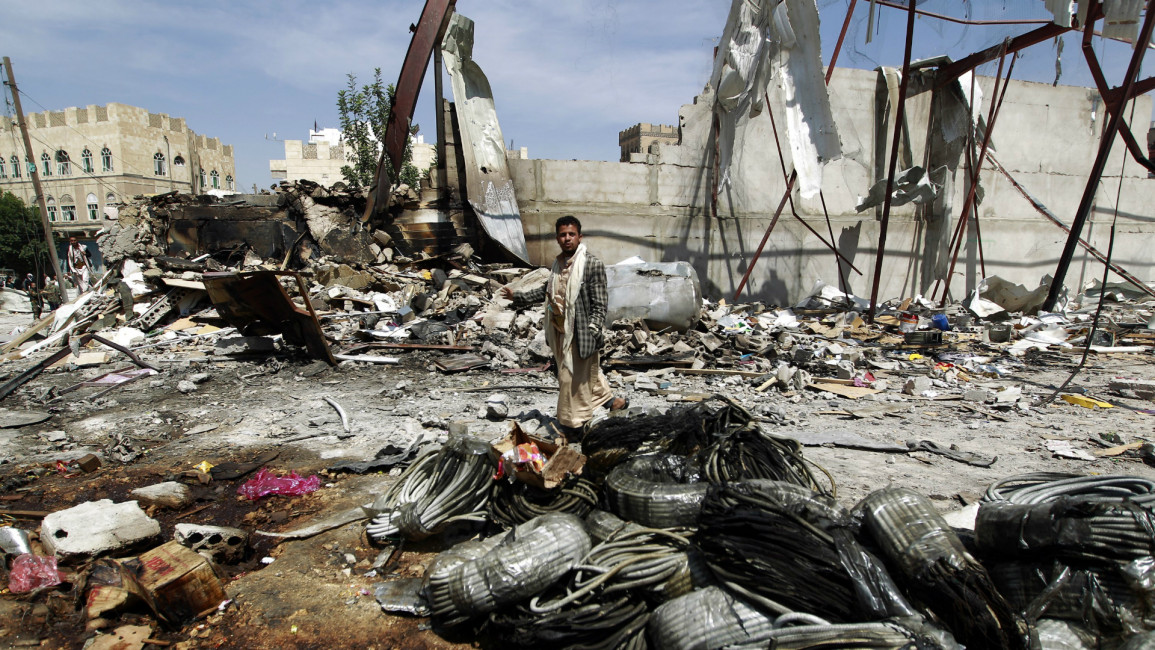
Is the US liable for war crimes in Yemen?
Hypocrisy in international relations is not strange among superpowers, and is often part of the realpolitik of the global diplomatic stage.
Hence, when America condemns Russia for the harm caused to the civilian population in Syria, it does so while being complicit in the same in Yemen, where its ally, Saudi Arabia, is leading an offensive to oust Houthi rebels, in support of the government of exiled President Hadi.
Washington's complicity comes from its military support, by way of intelligence provision and weapons transfers, which enables the kingdom to execute its campaign of air raids, leading to widespread civilian casualties as hospitals and schools are hit, in what has become a grave human rights abuse in contravention of international law.
The US is aware that American-made weapons are being used by the coalition, and, furthermore, they have approved a $1.29 billion sale of arms to the Saudi Air Force and a $380 million sale to the UAE, also in the Saudi coalition, as their stocks deplete from an aggressive campaign.
If an independent investigation were to find the Saudi coalition guilty of war crimes, the US would be responsible for supplying the arms to commit those war crimes. Washington officials can be in no doubt as to what the weapons are being used for, or at the very least, are not taking steps to investigate allegations of wrongdoing.
A recently uncovered cluster bomb in a Sanaa neighbourhood - which may indicate transgressions of the laws of war due to the indiscriminate nature of the use of cluster bombs - places further onus on the US to take steps to investigate Riyadh's alleged war crimes.
The bomb, found in a residential street, was believed to have damaged a school, homes and vehicles. It reportedly bore the markings of a Tennessee factory and was manufactured in 1978. It could most likely have been provided through an arms sale in the 1990s, experts said.
This is evidence that the US should be concerned about, as it is shows that their weapons are being used to commit human rights abuses. Instead of making weapons deals worth millions of dollars, they should be halting all defence trade with Saudi Arabia.
However, this is not the only incident, and the evidence of cluster munitions used by the coalition has been aggregating since the start of its involvement in the Yemen civil war.
But the US has been aware and unwilling to intervene.
Washington's standpoint is that if the US isn't leading the fight, then they have no place to tell allies when and where to use cluster munitions. Using Saudi Arabia in this regard is beneficial to their war business, encouraging allies to fight doorstep battles while profiting from arms sales.
This is folly, and the Obama administration should be aware that its provision of arms in blatant disregard for non-combatant human life implicates them as an actual party to the conflict through military support.
 |
This raises the question of what value the Geneva Conventions have |  |
The law is laid out, and other allies of the kingdom have been warned by their lawyers. UK Defence Minister Philip Hammond has said that, after providing missiles that officials admit may have been used by the coalition to destroy civilian property - a war crime - Britain would suspend weapons deliveries to Riyadh if an investigation were to find that they had broken international law.
The international regard for humanitarian law in recent years has been abysmal, and the number of civilian casualties and the subsequent refugee crisis has given evidence of this.
Whereas civilian casualties used to make up around five per cent of all deaths in war at the borth of the 20th century, the figure has since climbed to 90 per cent. Global displacement has been estimated to have reached an all time high of 59.5 million people currently unable to return to ther homes, compared with 37.5 million a decade ago.
This raises the question of what value the Geneva Conventions have - unless being used as an example of piety against smaller states with less hegemonic clout.
Careless regard for human life cannot be dismissed by proxy, and not only should arms trades be suspended but active diplomatic pressure needs to be exerted on Saudi Arabia and the US to halt activity that breaks international humanitarian law.
Sophia Akram is a researcher and communications professional with a special interest in human rights particularly across the Middle East. Follow her on Twitter: @mssophiaakram
Opinions expressed in this article remain those of the author and do not necessarily represent those of The New Arab, its editorial board or staff.



